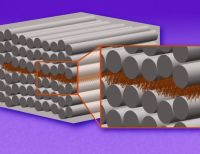In October 2017, MIT made a commitment to add 950 on-campus beds for graduate students as part of the Volpe zoning agreement with the City of Cambridge that allows the Institute to develop a 10-acre parcel in Kendall Square. Since then, MIT opened the Graduate Tower at Site 4 residential community in Kendall Square with about 250 net-new beds for graduate students and families, and reallocated the 135 beds in 70 Amherst Street to graduate students.
In December 2020, MIT entered into a partnership with American Campus Communities (ACC) to build and operate a graduate housing complex on Vassar Street, adjacent to Simmons Hall. Owned by MIT but operated by American Campus Communities, this MIT-affiliated community fulfills the Volpe commitment and introduces a new residential option for graduate students and families. Named “Graduate Junction,” the residence is split between two buildings framing a gateway to Fort Washington Park and the Cambridgeport neighborhood. Flanking a central plaza and green space, the buildings will rise in five- and six-story sections and then progress to a 10-story segment as it extends beyond the park. Housing options will include efficiencies and one-, two-, and four-bedroom units that will be licensed by ACC to individuals, couples, and families.
With the addition of 676 beds at the new Graduate Junction and the beds gained by the reconfiguration of rooms in other buildings, the Institute has now exceeded the original commitment with a total of 1,076 new graduate beds. With Graduate Junction due to open this August, David Friedrich, senior associate dean for housing and residential services, shared some important project updates and perspectives on what potential residents can expect from the newest graduate residence on MIT’s campus.
Q: How is the Graduate Junction project going, and when will it open?
A: You can already see the buildings taking shape on Vassar Street and the construction timeline puts us on target for an August 2024 opening. This is a product of years of collaborative work with students and campus stakeholders, who teamed up to design an option to fill gaps in the student housing market. It is thrilling to see it near completion.
The project is also going well thanks to our productive relationship with ACC. ACC is an experienced student housing company and has built or managed more than 100,000 beds on more than 90 campuses across the U.S., including graduate residences at peer institutions. As we add this new MIT-affiliated housing option to our portfolio of residences, we’re actively working with the leadership of ACC to onboard the team that will manage the property. Kendra Lowery, the general manager of Graduate Junction, is a dynamic and thoughtful partner with a breadth of experience managing student housing. She will be an excellent resource for Graduate Junction residents.
We are pleased to meet the recommendations of the 2018 Graduate Housing Working Group to add beds while providing students with additional cost-effective options for their residential experience. The Working Group — composed of students, staff, and faculty — was instrumental in shaping the project and provided substantive data to inform an optimal combination of unit types and amenities desirable to graduate students. In the coming weeks, we will highlight Graduate Junction alongside the Institute’s existing eight graduate residences to help students select the housing option that best suits their needs.
Q: How will living in Graduate Junction differ from living in MIT-operated residences?
A: Graduate Junction offers a new approach that combines apartment-style living with proximity to main campus — an off-campus experience with an on-campus location. Our partner ACC will be responsible for the housing license process, maintenance, building access, and IT infrastructure. While student residents will have access to MIT’s student support resources and can participate in on-campus social events, there will not be a faculty head of house or resident governance structure. Instead, ACC will directly work with Graduate Junction residents to address needs and answer questions.
Residents of Graduate Junction will enjoy the same flexibility and pricing of an on-campus housing license and will not need to pay first and last months' rent, security deposit, or a broker fee — all upfront costs typical of off-campus properties. Instead, Graduate Junction will have a utility-inclusive rental rate for furnished apartments set by MIT. Since this partnership with ACC provides a different model for managing on-campus residences at the Institute, this approach is also a pilot to test if partners like ACC can help the Institute manage the demand for graduate housing.
Q: What would you say to incoming graduate students considering Graduate Junction or other on-campus residences?
A: The MIT housing system is designed to offer students choices so they can determine their own residential experience. We want to make living on campus the first and best option and do so by careful analysis that prices our units at below market rates. Combined with the Institute’s support for students and families through the Office of Graduate Education, the on-campus experience is tailored to fit graduate student needs.
Graduate Junction responds to what students say is most important — location, unit configuration, all-inclusive payments, and flexibility in securing or leaving their housing arrangements. Bordering Cambridgeport, Graduate Junction is proximate to Cambridge public schools, local grocery stores, and neighborhood parks and playgrounds.
It joins a range of housing options available to students, and there are residences to fit a diverse array of budgets. With the added benefit of close proximity to labs and classes, student support, campus services, and other amenities, on-campus residences remain a great value. We invite graduate students to review the new rate sheet for 2024-25 and consider living on campus.














